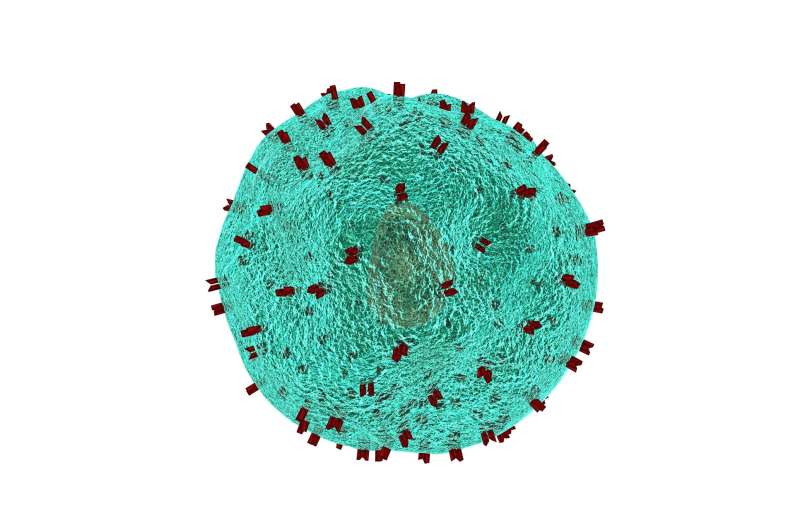Research team identifies new rare disease affecting hematopoiesis and immunity

The immune system is one of the most complex and fascinating networks in the human body. Comprised of cellular and humoral components, it not only protects us against external intruders such as viruses or bacteria, but also plays a fundamental role in detecting aberrant cells developing into cancer cells. The development and function of immune cells is tightly regulated by the temporal and spatial control of gene expression. This is mainly achieved by so-called transcription factors—special proteins that bind to regulatory sequences of genes and turn their expression on or off. In addition, there is another level of control: so-termed epigenetic remodelers control whether certain regions of the DNA are active or inactive, and thereby determine if transcription factors can bind to their target sequences or not.
The Ikaros family of zinc finger transcription factors represents a group of proteins that have been shown to play a central role in hematopoiesis and immune cell development and function. It is comprised of five known members: Ikaros, Helios, Aiolos, Eos and Pegasus. The roles of some of these transcription factors, in particular Ikaros, have been studied in detail with their aberrant function more recently being linked to the development of leukemia. The precise function of Helios, however, was only partially known.
Helios—a key player in T cell development and function
In a joint effort, the team of Kaan Boztug at the St. Anna Children’s Cancer Research Institute (CCRI) and the Ludwig Boltzmann Institute for Rare and Undiagnosed Diseases (LBI-RUD), in close partnership with the Medical University of Vienna and the CeMM Research Center for Molecular Medicine of the Austrian Academy of Sciences, investigated a patient with an unknown defect of immunity and hematopoiesis, who had been suffering from recurrent respiratory infections and hypogammaglobulinemia since birth. In their study, the scientists identified an inherited biallelic mutation—i.e., a mutation carried on both copies of the gene—in the gene encoding Helios, a transcription factor named after the Greek god of the sun.
Helios is predominantly expressed in developing thymocytes, activated T cells and regulatory T cells—a subset of T cells that play a role in controlling the immune activation response. In regulatory T cells, Helios is known to be important for regulating the transcription of several genes. Although Helios has already been studied in mice, its role in human immune homeostasis and T cell development remains unclear.
Biallelic mutation of Helios causes epigenetic defect and immunodeficiency
At a molecular level, the defect resulting from the biallelic mutation in IKZF2 did not affect DNA binding or dimerization of Helios but had other consequences. “We found that the mutation affecting Helios leads to disruptions in the interaction with other proteins, including epigenetic remodelers, thereby compromising the precise control of activation of genes”, explains Tala Shahin, first author of the study and Ph.D. student in Kaan Boztug’s research group.
The scientists used single-cell transcriptomics and in vitro functional assays to further study the effects of the mutation at a cellular level. They were able to show that the defect in Helios had detrimental effects on immunity: While CD8+ T cells carrying the mutation shifted towards a pro-inflammatory, effector-like status, patient CD4+ cells showed impaired activation. Additionally, a B cell defect was detected: there was a B cell loss over time, and peripheral memory B cells and plasmablasts were reduced, while transitional B cells were increased.
Impact on future research and treatment
As the proper activation of conventional T cells and the presence of B cells is important for mounting an immune activation response against infections and (pre)cancerous cells, these findings are of great interest. The results do not only characterize a novel inborn error of immunity, but also further define and expand our understanding of the role of Helios in immune activation and homeostasis. The Helios-dependent epigenetic regulation defect represents a novel molecular mechanism leading up to the severe loss of balance (homeostasis) of immunity as seen in the disease.
“This study represents a significant advance in our understanding of the precise role Helios plays in hematopoiesis and immunity and it will help future efforts to potentially target these regulators in both immunodeficiency and malignancy,” summarizes Kaan Boztug, senior and corresponding author of the study and scientific director of CCRI.
Source: Read Full Article


